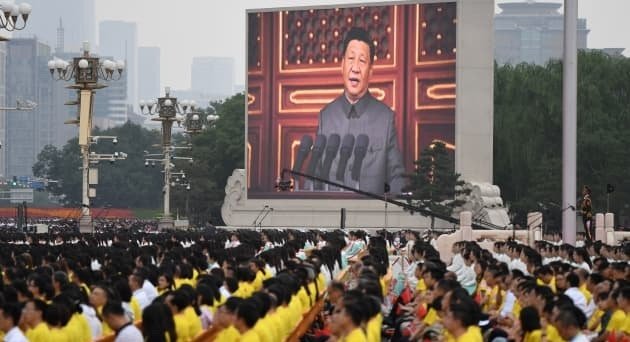Virendra Pandit
New Delhi: “Let China sleep, for when she wakes, she will shake the world” Napoleon Bonaparte was said to have remarked in the early 19th century. Whether or not he really said so, the Chinese Communist Party (CCP) has created a very concerning reality to this statement in recent years.
Many view China as a waking giant, a Dragon, aspiring to control the Earth. They have accused Beijing of unleashing the ‘biological war’ against its enemies by ‘releasing’ the Covid-19 pandemic.
In the 2008 Hollywood movie The Mummy: Tomb of the Dragon Emperor, the Chinese monarch unleashes his rejuvenated Terracotta Army on his enemies, but is eventually annihilated by the corpses of his foes, buried under the Great Wall, also reviving to exact revenge.
A similar scenario may be emerging in the People’s Republic of China (PRC) which celebrated the 100th anniversary of the foundation of the CCP last week.
Centenary celebrations are formal official events, the razzmatazz efficiently choreographed by the governments to keep the hoi polloi busy in sweet nothings, as few actually remember the past and fewer still want to relive it. The rulers often use the occasion to whip up emotions, cover up their follies by high-decibel propaganda, and warn their enemies.
The PRC’s President-for-Life Xi Jinping did it all on July 1. Donning a Mao Zedong outfit, instead of a western suit for a change, he tried to present himself as the Great Helmsman in the 21st century. Like Josef Stalin in the early 1940s, Xi also whipped up the ‘nationalist’ credentials of the CCP. But Stalin had done it to awaken the Russian nationalists against the German Nazis’ assault during the Second World War; Xi did so when the world is encircling an expansionist China from without, and the rebels are ganging up against him from within.
To warn them, he unleashed his Terracotta Army—from the same place, Tiananmen Square, where his predecessors had brutally crushed democratic aspirations in China in 1989, choreographing nationalist-cum-expansionist dreams of a wannabe ‘superpower’.
“The Chinese people have never bullied, oppressed or enslaved the peoples of other countries, not in the past, not now and not in the future,” he claimed, just a year after his government bullied India and the People’s Liberation Army (PLA) tried to invade East Ladakh along the Sino-Indian Border to change the status quo and is still engaged in a standoff.
“At the same time, the Chinese people will never allow foreign forces to bully, oppress or enslave us,” he added.
Then like Hitler—no wonder he is now mocked as Xitler!—he thundered:
“Whoever nurses delusions of doing that will crack their heads and spill blood on the Great Wall of steel built from the flesh and blood of 1.4 billion Chinese people.”
His remarks reflected his own delusions of grandeur, coupled with insecurity and vulnerability, and also an increasing unease among his many CPC enemies biding time to strike ever since he manipulated them in 2018 to sit on their heads as their President-for-Life.
He also reminded the Chinese, especially the 800-odd billionaires, that the CPC was their savior, warning and cajoling them at the same time.
“For 100 years, the Chinese Communist Party has led the Chinese people in every struggle, every sacrifice, every innovation…“In sum, around one theme — achieving the great rejuvenation of the Chinese nation.”
“Listen to the party, be grateful to the party, and follow the party,” his acolytes shouted. “Let the party rest assured, I’m with the strong country!”
China, he said, was a force for peace in the world and wanted peaceful unification with Taiwan, the self-governed, democratically-run island that Beijing claims as its territory. “Nobody should underestimate the staunch determination, firm will and powerful capacity of the Chinese people to defend national sovereignty and territorial integrity.”
By raising the Taiwan issue, he sought to arouse nationalist feeling and unite all the Chinese under Beijing’s hegemony.
He believes that the CCP must control the nation for its own good and that he must remain the chief driver of the party and China. That was why, in 2018, he abolished the two-term limit to the Chinese presidency, opening for himself the way to remain office ‘until eternity’ like the Dragon Emperor in the Hollywood film.
Taiwan’s case is different. Most Taiwanese have little interest in unification with China under Communist rule, despite Xi’s hardline speech.
“Solving the Taiwan question and realizing the complete reunification of the motherland are the unswerving historical tasks of the Chinese Communist Party and the common aspiration of all Chinese people,” he said while vowing to “resolutely smash” any moves to push Taiwan toward full independence, indirectly warning America and its allies.
Predictably, Taiwan’s Mainland Affairs Council responded swiftly with a strongly-worded statement calling on Beijing to respect human rights and cease its “bullying” behavior.
“Democracy, freedom, human rights and the rule of law are the core values of Taiwan’s society,” it said. “There is a major systemic difference with the dictatorship on the other side of the strait.” Many Taiwanese call the Chinese Communists “bandits”.
Predictably, Xi said nothing about the two global issues, Covid-19 and Xinjiang, and restricted himself to Hong Kong and Taiwan.
The Dragon tried to spit first fire but it could not scare anyone.

